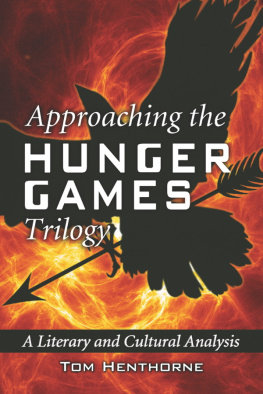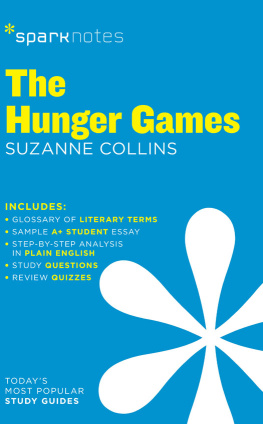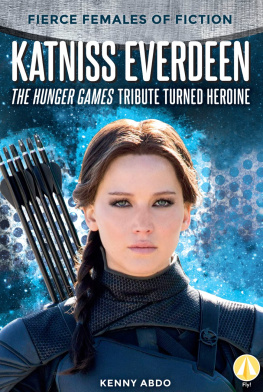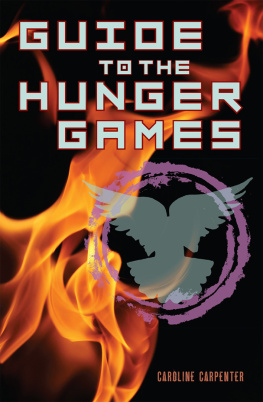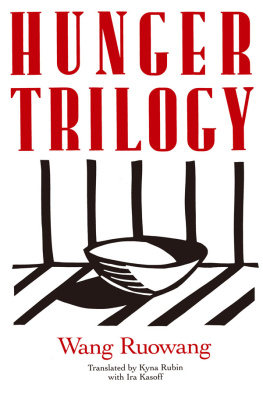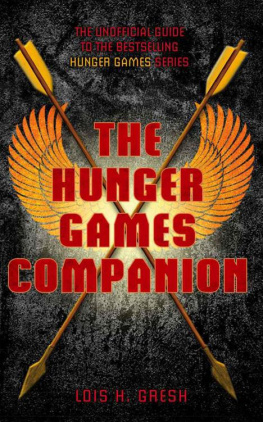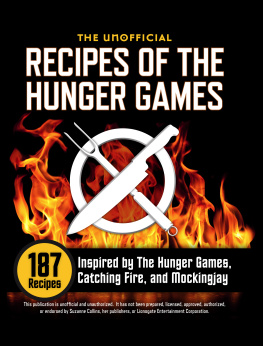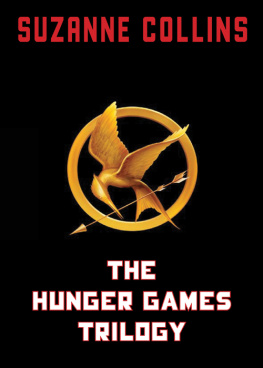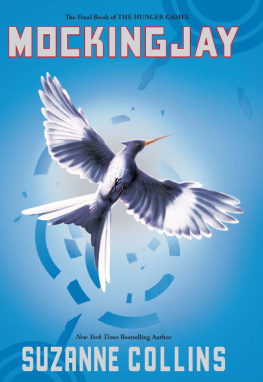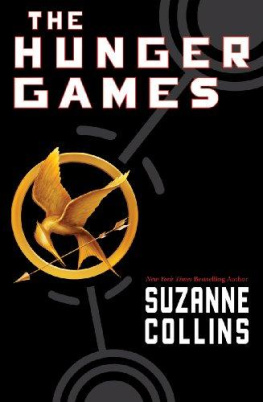Tom Henthorne - Approaching the Hunger Games Trilogy: A Literary and Cultural Analysis
Here you can read online Tom Henthorne - Approaching the Hunger Games Trilogy: A Literary and Cultural Analysis full text of the book (entire story) in english for free. Download pdf and epub, get meaning, cover and reviews about this ebook. year: 2012, genre: Art. Description of the work, (preface) as well as reviews are available. Best literature library LitArk.com created for fans of good reading and offers a wide selection of genres:
Romance novel
Science fiction
Adventure
Detective
Science
History
Home and family
Prose
Art
Politics
Computer
Non-fiction
Religion
Business
Children
Humor
Choose a favorite category and find really read worthwhile books. Enjoy immersion in the world of imagination, feel the emotions of the characters or learn something new for yourself, make an fascinating discovery.
- Book:Approaching the Hunger Games Trilogy: A Literary and Cultural Analysis
- Author:
- Genre:
- Year:2012
- Rating:3 / 5
- Favourites:Add to favourites
- Your mark:
- 60
- 1
- 2
- 3
- 4
- 5
Approaching the Hunger Games Trilogy: A Literary and Cultural Analysis: summary, description and annotation
We offer to read an annotation, description, summary or preface (depends on what the author of the book "Approaching the Hunger Games Trilogy: A Literary and Cultural Analysis" wrote himself). If you haven't found the necessary information about the book — write in the comments, we will try to find it.
Tom Henthorne: author's other books
Who wrote Approaching the Hunger Games Trilogy: A Literary and Cultural Analysis? Find out the surname, the name of the author of the book and a list of all author's works by series.
Approaching the Hunger Games Trilogy: A Literary and Cultural Analysis — read online for free the complete book (whole text) full work
Below is the text of the book, divided by pages. System saving the place of the last page read, allows you to conveniently read the book "Approaching the Hunger Games Trilogy: A Literary and Cultural Analysis" online for free, without having to search again every time where you left off. Put a bookmark, and you can go to the page where you finished reading at any time.
Font size:
Interval:
Bookmark:

William Gibson: A Literary Companion
(McFarland, 2011)
LIBRARY OF CONGRESS CATALOGUING-IN-PUBLICATION DATA
Henthorne, Tom.
Approaching the Hunger Games trilogy : a literary and cultural analysis / Tom Henthorne.
p. cm.
Includes bibliographical references and index.
ISBN 978-0-7864-6864-5
1. Collins, SuzanneCriticism and interpretation. 2. Collins, Suzanne. Hunger Games. 3. Young adult fiction, AmericanHistory and criticism. I. Title.
PS3603.O4558Z6845 2012
813'.6dc23 2012022250
BRITISH LIBRARY CATALOGUING DATA ARE AVAILABLE
2012 Tom Henthorne. All rights reserved
No part of this book may be reproduced or transmitted in any form or by any means, electronic or mechanical, including photocopying or recording, or by any information storage and retrieval system, without permission in writing from the publisher.
Front cover images 2012 Shutterstock
McFarland & Company, Inc., Publishers
Box 611, Jefferson, North Carolina 28640
www.mcfarlandpub.com
I want to begin by thanking my sister Nancy for recommending The Hunger Games to me years ago and my sister Susan for sharing her own young adult fiction with me. The rest of my family has also been critical to the project in ways that are not always so obvious, so I want to thank them as well, namely Samuel, Amy, and Madeleine Henthorne; Mathew and Jack Pivarnik; Philip Mostic; Shaelyn, Kai, and Zoe Ransome; Eden, Holden, and Talia Way-Marcant; Katie Way; and, of course, Paul Way-Henthorne. Special thanks go to Juliet Way-Henthorne for her careful work as a research assistant and to Zane Way-Henthorne as a copy editor. And to Patricia Way, of course, for everything else.
Richard, Christine, Danny, Tommy, and Marco Nardi have also been very important to this project, as have my friends, students, and colleagues Sarah Blackwood, Kathie Cheng, Carol Dollison, Martha Driver, Dara Feldman, Amy Foerster, Kathryn Gau, Qian Hua Ge, Sandra Gonzales, Brittney Hagan, Stephanie Hsu, Karla Jay, Lindsey Lee, Victoria Measles, Tony Murphy, Cody Osterman, the Scaleras, Andrew Theori, Lee Transue, Catherine Zimmer as well as historians-at-large Nancy Reagin and Bill Offutt. I also want to thank Karlene King, Mona Khaldi, Megan Maule, Noelle Tennant, and the other members of OUT House for their assistance, support, and humor.
Special appreciation goes out to Kristen di Gennaro, Agie Markiewicz, Sid Ray, and Jonathan Silverman for their usual assistance, which I fear I take for granted and can only hope to return when they are similarly overwhelmed. And thanks to Gwendolyn Limbach for her invaluable help in the early stages of the project. The students in my literature and womens and gender studies classes at Pace University were also of tremendous help, not only because they shared their insights but because they continually remind me to not take myself or my work too seriously.
I also have great appreciation for the Pace University library staff, particularly those working in the interlibrary loan office, Amernel Danton, Chloe Pimera, and Editha Wilberton, who are always so kind and efficient. Pace Universitys Scholarly Research committee also deserves thanks for granting me released time to work on this book, as do Nira Herrmann, dean of Dyson College, and Associate Deans Adelia Williams-Lubitz and Andres Villarga for their continued support. I am also grateful to Students Against the Pacetriarchy for making the university a better place.
Additional thanks go to Has Beans, Sit and Wonder, the Velvet Peach, the Tea Lounge and various other places in Brooklyn that provide coffee, bathrooms and wireless to people like me, as well as places like the Coffee Bean and the Goleta Public Library in Goleta, California. Starbucks deserves special mention for being just about everywhere, including airports and grocery stores, and for being open late and on most holidays.
Now Im not a person who cries easily when she reads something, particularly something for kids. Yet as I was taking a train to Long Island I found myself tearing up over significant parts of this story [The Hunger Games]. Its good. And its so ridiculous that a work of science fiction like this could even be so good.
Elizabeth Bird, Review of the Day: The Hunger Games by Suzanne Collins, School Library Journal
...the Hunger Games, like Harry Potter, His Dark Materials, and Twilight, is a series written for young readers but heavily colonized by adults. Why do these books in particular grip adults? What is it about the Hunger Games that allows me to read them without shame on the subway?
David Plotz, Mockingjay Left Me Sated, Not Satisfied, Slate Magazine
The Hunger Games trilogy has become a literary and cultural phenomenon. People are reading it on trains, in restaurants, and even while walking. Down with the Capitol tee-shirts can be purchased at Hot Topic. Fansites with names like The Hob, Jabberjays, and TheGirlonFire.com are drawing thousands of users daily. Mockingjays light blue cover can be seen poking out of childrens bookbags. People can go to InStyle magazines website to see what they would look like with Katniss Everdeens signature braid. Millions of copies of the books have been purchased for Kindles, Nooks, and iPads. The books are referenced in mainstream media, taught in schools, and have even been the subject of academic conferences. And all of this happened before the first movie was released.
To an extent, the Hunger Games Trilogy phenomenon can be understood as being part of a larger cultural trend, one that became visible when the Harry Potter books went to the top of the New York Times bestseller list in 1999 and stayed there until the Times created a separate list for childrens books to clear some room for books written for adults (Smith). Like the Harry Potter series, which was published between 1997 and 2007, and The Twilight Saga, which ran from 2005 to 2008, the Hunger Games trilogy appeals to a very broad demographic, as evidenced by overall sales in the millions: the books are popular with readers of all ages and marketed accordingly (Springen 2010). But the Hunger Games trilogy is markedly different from the other two series in the nature of its appeal, Suzanne Collinss work being cynical and ironic in ways that Harry Potter and Twilight are not. As Rebecca Cusey points out in an article for The Daily Caller, Rowlings series is essentially conservative, affirming traditional values as the title character comes to believe in justice, freedom, and basic decency, to identify the trustworthy, and to take responsibility for fighting evil in his time. The Twilight series is even more conservative, possibly even reactionary, in its heteronormativity, its attitudes towards authority, and its celebration of traditional American values. For Katniss Everdeen, in contrast, [j]ustice doesnt exist and freedom is an illusion and the trilogy ends with her being used up psychologically and emotionally, thoroughly disillusioned (Cusey).
The Hunger Games trilogy, of course, is a product of its era, just like every other cultural artifact. The appearance of the first volume of Collinss series coincided almost exactly with the beginning of the world economic crisis that began in late 2008. Although critics could hardly argue that The Hunger Games represents a reaction to the crisisthe volume having been completed before the crashthe mood of the time shaped its reception; the books biting irony matched the mood of the times as a population, which was already weary of the ongoing wars in Afghanistan and Iraq, and suspicious of its political leaders, faced a very real prospect of economic ruin.
Next pageFont size:
Interval:
Bookmark:
Similar books «Approaching the Hunger Games Trilogy: A Literary and Cultural Analysis»
Look at similar books to Approaching the Hunger Games Trilogy: A Literary and Cultural Analysis. We have selected literature similar in name and meaning in the hope of providing readers with more options to find new, interesting, not yet read works.
Discussion, reviews of the book Approaching the Hunger Games Trilogy: A Literary and Cultural Analysis and just readers' own opinions. Leave your comments, write what you think about the work, its meaning or the main characters. Specify what exactly you liked and what you didn't like, and why you think so.

